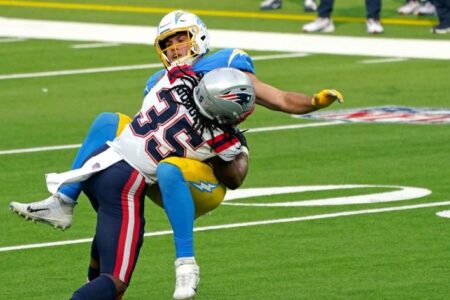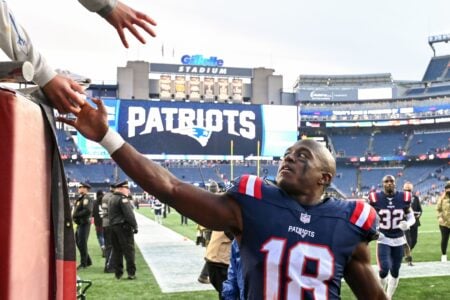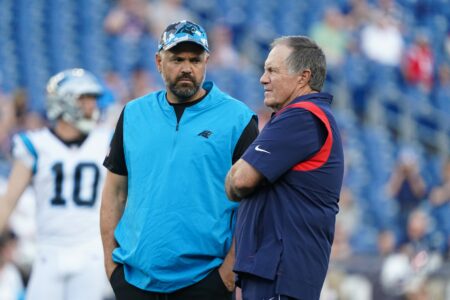- Joined
- Apr 3, 2006
- Messages
- 26,100
- Reaction score
- 52,114
Registered Members experience this forum ad and noise-free.
CLICK HERE to Register for a free account and login for a smoother ad-free experience. It's easy, and only takes a few moments.Back to that 1981 season because it brings together some of the themes of this thread. This is about history being written by the winners, where I've argued that many times coaches, offensive systems, and "team culture" are given an astronomical boost when in fact some critical, crunch time quarterback play was the reason one system/coach is a genius and the other is an also-ran (in the eyes of the public.)
So, 1981, the Super Bowl teams are very interesting. You have two quarterbacks, Joe Montana and Ken Anderson, who are both proteges of this "West Coast Offense" which emphasizes short passing. Now, I'm not going to derail this post by going way off on a tangent about systems being overrated (as it relates to individual team systems, not to historical trends), but you might also note that the QB protection/defensive back rules were changed at that time, as we had just posted about, so the passing game suddenly had advantages that it previously did not...all across the NFL quarterbacks would put up next level numbers in the 1980s with some different flavors on their personnel. I think one of the key things the WCO did was get away from a smashmouth style of offense and instead rely on the quicker, shorter stuff...even though that was really nothing new at all, but it helped to get away from a formula of when exactly to run/pass and who should catch passes, etc.. Sammy Baugh was dinking and dunking with short, quick passes in the 1930s, and so were quarterbacks since that time. One major advantage, though, are the rules...quick passes and defensive backs limited on how much jamming they can do.
You have two offenses in the Super Bowl running the same "system" in a copy cat league, and there's a reason that other teams can't simly copy it. It's because Anderson and Montana were really freaking good quarterbacks.
Now Walsh came from the Bengals, which makes this interesting. In the 70s, he was their offensive coordinator and then passed over by Paul Brown (who had bolted the Browns and formed the Bengals years before) and washed up with the 49ers a few years later, building off of concepts that were already being used in Cincinnati, San Diego, and all over the place.
So why is Bill Walsh credited with being the master, uber genius behind the WCO while these other Cincinnati yo-yos, who were in fact running a similar offense with Ken Anderson, lost in the footnotes of history?
Super Bowl XVI is the answer, or at least the point where the two franchises went in very different directions. The veteran QB (Anderson) crapped the bed while the young guy (Montana) didn't. And this is yet another one of those myths out there, that the more experienced QB gets special mental experience points in big games...but back to the game....
In SBXVI, the Bengals and 49ers were essentially pick em in Vegas.
In the end, Montana played balls to the wall; he didn't put up big numbers but made all the big throws. Anderson wasn't the only one to blame, but he failed to play at a championship level.
- The 49ers fumbled the opening kickoff, and the Bengals drove down the five-yard line, first down. Ken Anderson went Incompletion - Sack (!) - Interception (!!). This is the type of momentum swing that can be impossible to recover from.
- (This isn't on Anderson, but the Bengals then drove to tie the game, but Collingsworth fumbled at the 49ers 8 yard line; Montana then drove the 49ers 92 yards for a 14-0 lead.)
- Trailing 23-14 in the fourth quarter, Anderson got the ball and threw his second interception of the game.
The aftermath, like we've seen so many times with Brady, is the immediate crediting of the winning coach (Walsh) and system (WCO) as being ingenius (a theme that, with the 49ers, still resonates 40 years later). Of course, on the other sideline, that same WCO was used but didn't result in a win. And I'm not dismissing the later 49ers teams and ignoring that this dominance went on for 20 years...I'm just pointing out the origins of it...but suffice to say, those teams were talented as hell and had the league's best quarterback all the time. They could have run the Tecmo Bowl playbook.
A comment was made that Ken Anderson would have won multiple Super Bowls with Belichick. Would he have? He had a chance to win his first with the Bengals; the organization put a very good team around him, an "innovative system", etc. That's what coaches can do, though, is put players in position to succeed...the players, especially QBs, are responsible for the success or failure after that. And this isn't to knock Ken Anderson, who I believe should be in the Hall of Fame and is the most underrated passer of his era. It's just to reiterate that players win games and build legacies. Imagine how much different everything plays out if Joe Montana, in 1981, craps the bed in the Super Bowl, while Ken Anderson dominates the 49ers.
Atlanta vs Patriots - who blew that one?
Play calling did. Quinn or Shanahan.
Systems and schemes do matter, players performances absolutely matter but so do coaches.
The difference between Ken Anderson and Montana may have been coaching decisions.
I’ll get into this more when I have time, but I wouldn’t say the Falcons “blew it” so much as the Patriots were a historically dominant team, but the criticism of Shanahan is absurd. Some say he was too aggressive and some say he was too conservative. The biggest play of the game was Ryan taking an astonishingly bad sack on 2nd and 9 after the Julio Jones catch. How would a coach be able to anticipate that stupidity?
I would recommend re-watching the very last Falcons drive in regulation if you want to know who would be the most to blame. Truly one of the most gutless drives I’ve ever seen. 45 seconds, one of the greatest passing offenses ever, all-world kicker, and Ryan really looks like he’s going to barf all over himself, completely unhinged and throwing way, way short of what was required. And before people say the game was already over, momentum, etc., please contrast this to Tom Brady’s response to the defense collapsing and blowing a 14 point lead in SB36, SB39, or many other examples.
Do you mean the difference between Anderson and Montana in that game only or in their careers?
Systems and schemes matter, and having a QB drafted by the "wrong" team can mean a worthy QB's career ends up as nothing, or far less than it could have been (see Flutie, Doug). But that wasn't the difference between Anderson and Montana. The difference between Anderson and Montana was that Montana was the superior player, and his play at the end of his career, when in Kansas City, served to solidify that notion.Atlanta vs Patriots - who blew that one?
Play calling did. Quinn or Shanahan.
Systems and schemes do matter, players performances absolutely matter but so do coaches.
The difference between Ken Anderson and Montana may have been coaching decisions.
Systems and schemes matter, and having a QB drafted by the "wrong" team can mean a worthy QB's career ends up as nothing, or far less than it could have been (see Flutie, Doug). But that wasn't the difference between Anderson and Montana. The difference between Anderson and Montana was that Montana was the superior player, and his play at the end of his career, when in Kansas City, served to solidify that notion.
I hear you. I just saw Tony taking the notion of scheme/coach too far, and this is a thread where I think we need to be more precise with our language. Accepting that such a situation would be more difficult to overcome in the early days of different draft rules and no free agency, we've still seen plenty of evidence that elite QBs are elite QBs despite location/coach, and scheme can be fluid with its defining. Guys like Montana, Manning, Favre (and Green Bay got him at the very beginning) and Brady have made that very clear.I don't mean to imply that coaches and schemes amount to nothing, just that it's much easier to be a genius when you have the best players.
After Julio's catch they should have run, run, run. Kick a field goal and put the game out of reach.
Anything that happened after that is meaningless.
Yes the coaches blew that game. No doubt.
I meant the difference between Anderson and Montana was or could have been the coaching during that game.
Okay, so I don't disagree with your premise re: the Falcons and Shanahan's decision there. Of course, this is the internet, so it's very serious business and my honor must be defended, and I'd rather die 1,000 fiery deaths than concede a point to another anonymous stranger. So, here goes:
I think that Shanahan's decision to pass there is misunderstood because it's almost counter intutive but that doesn't mean it was terrible, or even bad. There's the idea that the Falcons "had the game won" if they'd just run it, and I don't think that's true; I think they were very likely to win if they'd run it and very likely to win if they'd passed. When Julio Jones made that catch, it was 1st and 10 with 4:40 left in the game. The Falcons were at the Patriots 22-yard line. Then 2nd and 9 on the Patriots 21-yard line.
I think what gets overlooked here is that the clock loses most of its relevance, in terms of taking time off it if you're Atlanta. Why? Because if they run it three times, the Patriots call 3 timeouts, and the Patriots likely get the ball back and need to score (with no timeouts to stop the clock) and they'll probably need to recover an onside kick. If they throw an incompletion or two, the Patriots save those timeouts, but it's still going to take them time to score, and they'll still likely need an onside kick.
So I don't believe that running 3 times is justified by the idea that you want to grind down the clock because the the Patriots onside kick is the likely endgame either way. It would only be justified by the idea that you want to eliminate risk, but now we're looking at a different perspective because risk/reward here isn't as simple as just not turning the ball over...there's also field position. There's a risk of missing a 39/40 yard field goal. It's a likely successful attempt but not a sure thing.
So, do you run the ball (conservatively) and try a kick from that range and risk it, or do you try to move up a bit on the field for better probability? I think that's really the risk/reward formula that's being used, rather than the clock. Here are a few factors:
I feel like this is getting into the Seahawks - Russell Wilson - Marshawn Lynch - Malcolm Butler territory. It's hard not view this with hindsight as the results was so impactful and the call not really in line with traditional football wisdom. But the fact is, it was so incredibly unlikely that a team would be at the 22 yard line and back itself up 20 yards despite the players being completely aware of the situation and what not to do. I do think if they'd been at the 12-yard line, they definitely would have run it three times, and I think they were hoping to pick up 3-5 yards on first down to bring the field goal attempt closer, but they saw the Patriots were dominating the LOS.
- Losing yardage on the ground (Atlantta was getting annihiliated on the ground in the second half) is a possible outcome, and the Patriots were pinning their ears back to stop the run there.
- A sack alone shouldn't take you out of field goal range either (it was that extra penalty).
- Most likely, with that team, that offense, that quarterback, you're going to move closer and perhaps even pick up a first down. While there is the foreseeable risk of moving backwards, the idea that you're going to lose 20+ yards because of a sack and penalty is extremely unlikey.
- I just don't think calling a passing play there was a big deal, and it isn't 99% of the time, if you're confident that your quarterback will throw the ball away before risking any type of negative play. The players choked...first Ryan's sack and then Matthews holding penalty. Maybe Shanahan could have stuck with the run game, but would the win probability, without hindsight, have been greater? I don't think it's some huge margin.
If they'd run and gotten blown up on second and third down, losing 2/3 yards on both downs, resulting in a 45 yard field goal attempt, would it still have been the right call? Because getting stuffed twice like that is a much more likely and foreseeable outcome than an all-time great offensive unit, with a very intelligent and situationally great quarterback, losing 20 yards.
If you're Shanahan after the Julio catch what offensive play do you call next?
This is the internet and your entire posting history and honor relies on your response. Choose carefully my friend.
Me? I'm running it with the hopes that a successful field goal turns it into a two score game.
I do agree with you and Deus that Brady and Montana ruin my scheme or coaching decision argument because they were that great.
But If you're following Bobby Fisher's game strategy you run the ball.
Check Mate.
I would call my secret touchdown play that’s unstoppable, but I can’t show you the route tree because you’d sell it to Bob Kraft and he’d use it to beat TB12.
But seriously, I liked the run call on first down. After that, it’s not so obvious. Bill was begging them to pass by selling out for those the running lanes. It isn’t an easy call because you’re on a spot on the field where a few yards is worth so much because of the field goal length and the critical importance of making it. But I’d probably run because Matt Bryant was pretty automatic. A QB sneak or designed run play to hedge any big losses might be the best run call there.
Good points.
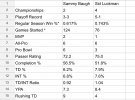
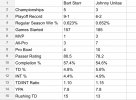
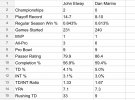
I find the below the most interesting when it comes to looking at the greatest quarterbacks. All three pairings had their careers overlap almost perfectly
Baugh vs Luckman
Starr vs Unitas
Elway vs Marino
Reading around various forums it seems that Luckman and Starr are seldom mentioned. Usually if you hear someone mention the greats from the earlier eras, it’s always Baugh, Graham, and Unitas.
I included Elway and Marino because I’ve seen around a 50/50 split on who’s higher all-time.
View attachment 33199View attachment 33200View attachment 33201
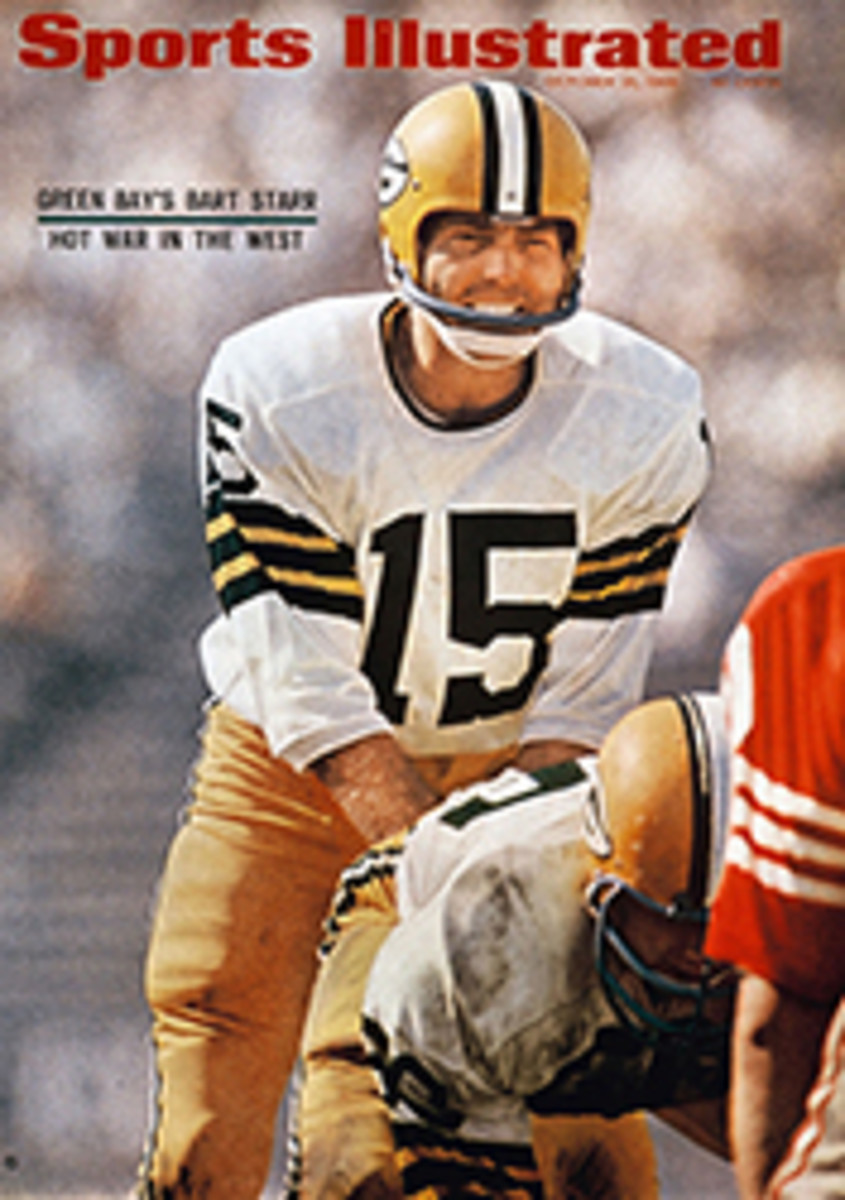
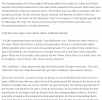

Great stuff. It seems most people always call Starr a game manager, beneficiary of his running game, and carried by his coach. I wonder where we've heard all of that before?This is some awesome stuff...I love these all-time great QB rivalries. All three of these rivalries had very different stylistic quarterbacks.
I was looking for H2H stuff with Starr and Unitas, and I came across this SI article from 1966...a real-time write up of the two QBs. I'm posting an excerpt, but the whole article is very good...one thing that really stands out is that Starr is clearly regarded as a superstar QB...this type of context helps us to with regard to Starr's stats which are polarizing when viewed through a modern lens.
Also note this comment about Star: "he is a brilliant play-caller." As I've written previously, people are absolutely full of sht or ignorant when they say (a) Starr was a system QB who took his orders from Lombardi like a robot and, (b) Unitas was the only, or the first, quarterback to call his own plays. The article explains that Unitas had more control but this wasn't some unique ability he had that Starr didn't have...also consider Unitas had two H of F receivers, whereas the Packers strength was their blocking and half backs. Of course one guy is going to appear to have a lot more creativity/artistry in the passing game.
Indeed, quarterbacks have tended to have more control of the gameplan, the further you go back in NFL history, which is why the idea that PEYTON invented this is so laughable it's hard to even fathom the level of ignorance.

HEATED PURSUIT OF THE PACKERS
IT WAS WIN OR DIE IN A TURBULENT RACE It was win or die in the West last Sunday as the National Football League season reached midpoint with four teams invault.si.com
View attachment 33242
More from that article about:
(A) the narrative that Starr was a robotic servant of Vince Lombardi isn't just wrong; it's essentially the opposite
Great stuff. It seems most people always call Starr a game manager, beneficiary of his running game, and carried by his coach.







